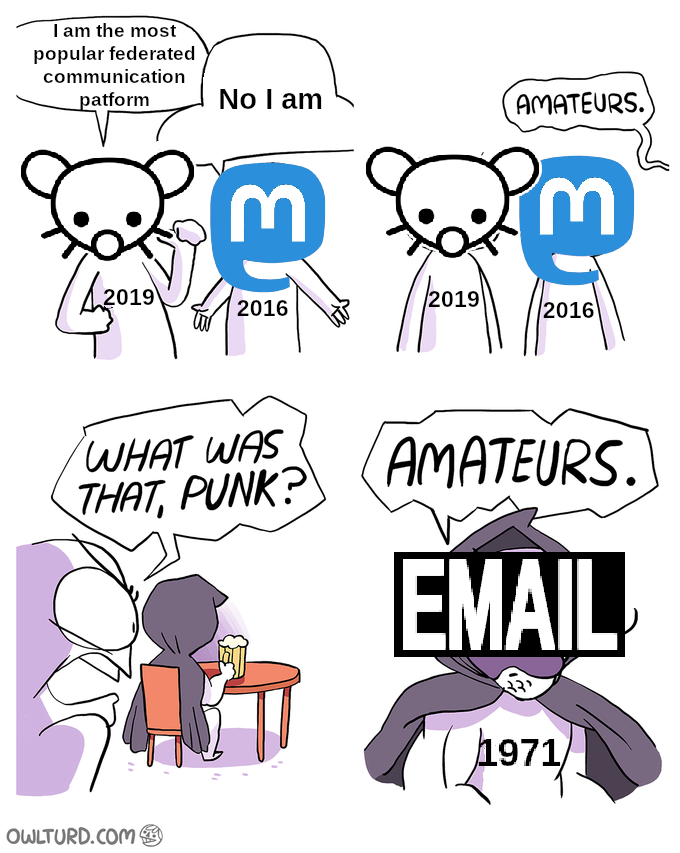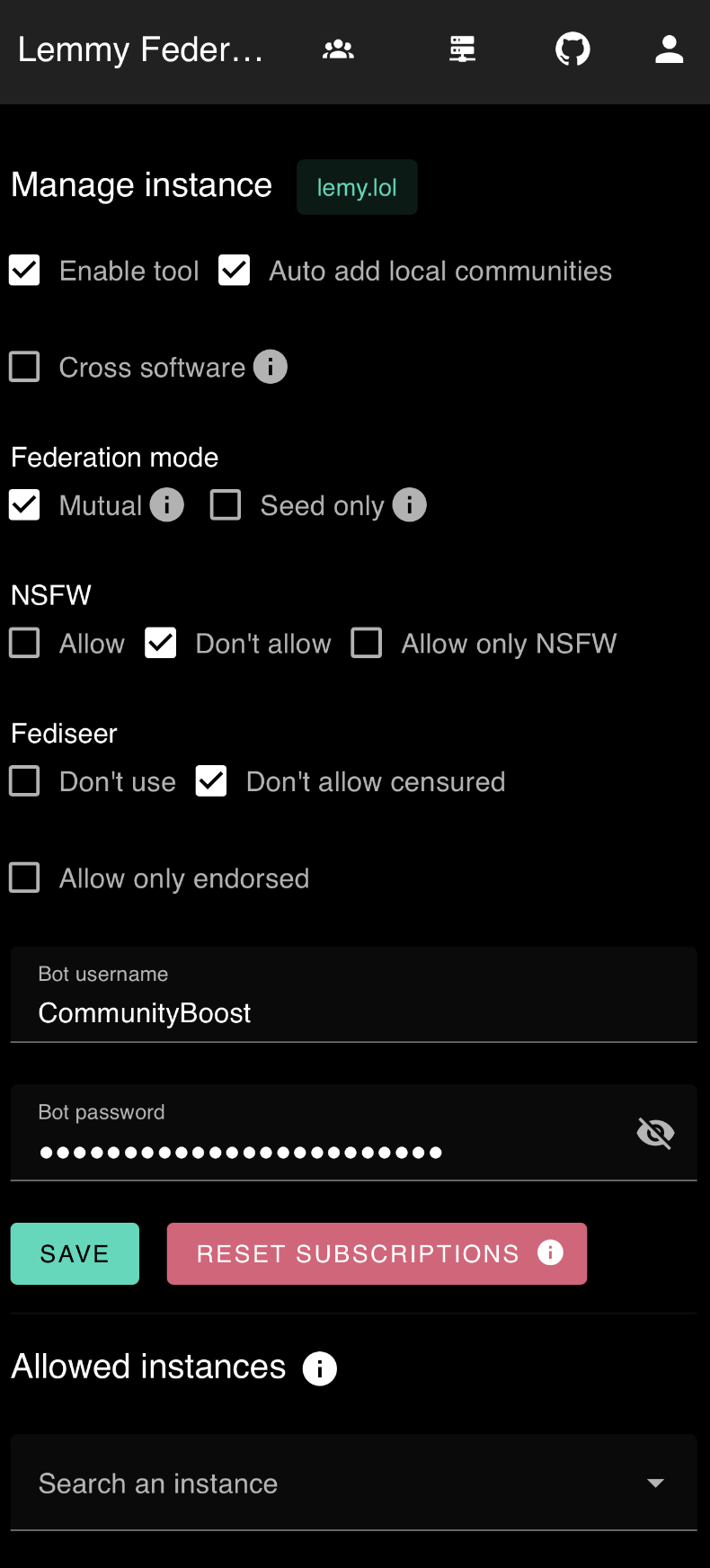Here's what I think. Bear with me, I'll come around to the moderation aspect.
The Old Internet
A social network lives or dies on the social contract between its
participants. The technology really isn't important at all, as long as
it's marginally functional.
The old-school internet had a strong social contract. There are little
remnants surviving, that seem hilarious and naive in the modern day,
but for the
most part the modern internet has been
taken over by commercial villains to such an extreme degree that a lot
of the norms that held it together during the golden age are just
forgotten by now.
- Web robots used to grab robots.txt, parse a file format that wasn't totally simple, and figure out what rules they needed to obey while crawling the site, and then they would obey them. Against all conceivable logic, this is still mostly true on the modern web.
- People used to type their email addresses in when they logged in over anonymous FTP, not because anything at all would happen if they didn't, but because it was polite to let the server operator know what was going on when you used their resources.
- April 1st used to be a huge holiday on the internet. Nothing could be trusted to work like normal. Everything was lies, but they were so cunningly crafted that a significant number of people would be taken in. People participated, both users and operators. It was like art. It was great days.
Basically, it was fun, and it was safe. That combination is harder to
do than it
sounds. It was a creative and comfortable place.
Starting with eternal
September, and up
until today, it's different. The modern internet would be
unrecognizable and tragic to anyone who was around back then.
Read this:
During the 1980s and early 1990s, Usenet and the Internet were generally the domain of dedicated computer professionals and hobbyists; new users joined slowly, in small numbers, and observed and learned the social conventions of online interaction without having much of an impact on the experienced users. The only exception to this was September of every year, when large numbers of first-year college students gained access to the Internet and Usenet through their universities. These large groups of new users who had not yet learned online etiquette created a nuisance for the experienced users, who came to dread September every year.
Now contrast that, the nature of the September internet and how little everyone could believe how unpleasant it was, and how it got fixed again every year after a short time, with the modern internet. It's been September for so long that the idea of an internet without annoying people on it, where everyone's mostly on the same page and just enjoying the interaction, or that we could "fix" the annoying people by them just learning how to behave, is comical. Tragic comedy, but comedy.
I think one core thing that made the difference is: It used to be a
privilege to be on the internet. You couldn't just do it. You either
had a tech job which was a rare and exotic thing, or you were a
student. If you weren't one of those things,
you weren't on the internet. End of story.
The great democratization was a great thing. Myspace and Napster were
great. It's good that anybody can be on
the internet. And
there's no going back anyway. We've got what we've got.
But I think a key thing that was lost is that it was ours. In
Douglas Adams's words, "One of the most important things you learn
from the Internet is that there is no 'them' out there. It's just an
awful lot of 'us'.
That used to be true, in a time now long gone. Now "they" have come to
the internet. Among other roles, "they" run your service, and
they don't give a fuck what you think. They want to make money off
you, they want to mine your data, they're going to choose what you
will and won't experience, and their priorities are not your priorities.
What This Means For Federated Community Internet
I think the federated social media that is coming now is a great
thing. It's fantastic. It's back to the old architecture, partially. But, I think it has unintentionally imitated some of the design
patterns that exist on the current "they" internet. Among them:
-
You don't control your experience. That is designed and curated
for you by "they." You can configure it, but you have to turn in a formal request if you want
to make changes outside the parameters, and since you're requesting someone spend significant effort
on you who
doesn't know you from a can of paint, the answer is probably no.
-
Anyone can join. It's free, the more the merrier, and if they turn
out to be toxic, then the other peons, or some volunteer moderators
if it gets bad beyond a certain point,
will have to put up with it.
I think this social-contract-free internet is a vastly reduced
experience compared with what could be. One of the features of
it being "ours" is that we have a shared responsibility to make it
good.
Here's how I see the social contract on the modern social internet,
according to the model that most federated social media has adopted:
-
Anyone can join. You can be as big a pain in the ass as you like, to
anyone at all.
-
The moderators are forced to deal with you. They come to expect
rudeness, dishonesty, greed, anger and deliberate destruction. They
have to, for no particular reward at all, deal with it all and keep
things on an even keel. Anyone they ban gets to make a new account and
have another go. Have fun!
-
Site admins and developers at least get their $500/month from kofi,
or whatever,
which I am sure is nice. But, in comparison to the vital nature of
their role and how difficult it is to do at scale, they get
nothing. They have to be missionaries going into the wilderness and
expecting to give of themselves to the world.
It's understandable to me for that arrangement to produce some
social interactions that are chaotic, toxic and pointless.
Most social contracts don't work that way. Someone in a "moderator"
type of role would get respect, sometimes they would get paid, there
would be a standard of shared conduct that everyone involved wanted to
see from everyone else involved. It's the difference between the
meditator in a social clique who helps when there is trouble, versus
HR, who doesn't really give a fuck what your problems are, and is just
there for their 8 hours.
I think this is the root of the "mods are assholes" issue. It's
not that the mods are power tripping. It's that they are placed in a
role that will lead inevitably to toxic behavior, unless
someone turns out to be a solid gold saint, which few of us
are.
I think that because there's no code of conduct from the users above
the bare legal
minimum, it's easy for a moderator to get jaded
by the absolutely unending stream of assholes they have to deal with,
and start to look at the nature of the whole thing as a toxic jungle
of racism and lies. Because why would they not? That's what it
is, in part, and they interact with that part every day.
A better arrangement is an understanding which involves the users
agreeing to something beyond the minimum in order
to participate. Something to make them aware that they are requesting
a privilege when they log in, that their participation in the system
can make it either
better or worse, and they recognize and respect their role in making
a nice place.
-
Having to write a few sentences about why you want to join, and having
the instance admin say yes or no, is actually a nice start. It's some
symbolic reframing, right at the start of the thing, that says, "Hey,
this is my place. Do you want to come in?" but holds you at the door
until we have a little conversation about it.
-
Old-school BBSs used to have an upload/download ratio. They dealt with
the same type of problem by having software-enforced limits on what
resources you were allowed to consume, and making you give back to
earn that privilege. I think that's great. There's not an obvious
translation of that into the Lemmy interaction model, but if something like
that could be achieved, I think it would be really good.
It's not that we need people to upload files or post a certain level
of content. It is that consuming
all these volunteered resources, including the eyeballs of others if
you want to say something that is self-serving instead of in service
to others, is a privilege, and that requirement reframes the entire
situation into something which I think is more wholesome and
appropriate, and nice to be a part of.
What To Do?
I don't really have an answer here. I am simply describing the
problem, and its impacts on moderation and social interaction, and how
similar problems have been dealt with in the
past.
Sorry for the abrupt ending, but I really don't have much more to say.
What do you think?

